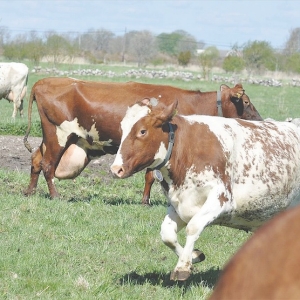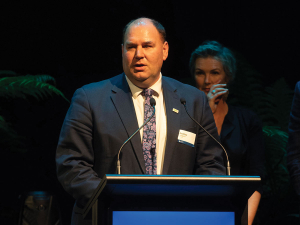Good animal care is behind the world’s most productive cow, DeLaval quotes the cow’s owner as saying.
For seventeen years, Vega, a cow on the island of Öland, Sweden milked 25kg every day – 156 tonnes of milk, 500% more than the average lifetime yield of a dairy cow in even high-producing countries.
And the farm has another cow, Docka, that has milked 70 tonnes, calved six times and shows no signs of stopping, DeLaval says.
“There is no secret to what we have done – animal health and welfare,” says Kerstin Persson, owner of the Arbelunda Sörgård farm.
“They need a nice life, and when they do, then we do too.”
This farm is taking a holistic view of calf and cow care, ensuring a healthy and happy cow all her life.
Four things contribute, she says. “She had a beautiful calfhood.
“She was young and well developed as a first calver. She was treated and cared for from the moment of birth.
“All her feeding over the transition periods from pregnancy to delivery and into lactation were excellent, every time.
“She was able to get pregnant quite rapidly after calving. And in order to calf quickly she needed to be fertile and healthy; she had no severe diseases such as mastitis and no lameness.”
“Farms like this are important for the future of the industry,” says DeLaval dairy development director, Charlotte Hallén Sandgren.
“We are committed to sustainable food production, so extending the lifetime of a cow is important. It lets you do more with less and improves animal welfare….
“There’s no point getting your cows older if you don’t take care of them. If you don’t meet their needs then you will have problems getting them older anyway. But if you treat them well, they will have a happier lifetime and produce more.”
$18,600 extra per year
Delaval calculates that 100 cows will earn an extra $18,600 per year if an extra lactation cycle is added to every cow.
The calculation is based on lower costs due to fewer heifers being raised and higher milk yield from elderly cows. Other studies show that if only the best heifers are bred then the genetic improvement increases these numbers even further.
And the farmer’s life gets better with happy, healthy cows.
“It means we can plan a trip to the cinema without having to worry about a cow that is sick because we simply make sure they’re all healthy. We win on several fronts,” says Kerstin Persson, owner of Arbelunda Sörgård farm.


















